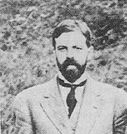Alfred Louis Kroeber (1876 – 1960)
+ Add Author to My Preferences
 Alfred Louis Kroeber (June 11, 1876 – October 5, 1960) was an American cultural anthropologist. He received his Ph.D. under Franz Boas at Columbia University in 1901, the first doctorate in anthropology awarded by Columbia. He was also the first professor appointed to the Department of Anthropology at the University of California, Berkeley. He played an integral role in the early days of its Museum of Anthropology, where he served as Director from 1909 through 1947. Kroeber provided detailed information about Ishi, the last surviving member of the Yahi people, whom he studied over a period of years. He was the father of the acclaimed novelist, poet, and writer of short stories Ursula K. Le Guin.
Alfred Louis Kroeber (June 11, 1876 – October 5, 1960) was an American cultural anthropologist. He received his Ph.D. under Franz Boas at Columbia University in 1901, the first doctorate in anthropology awarded by Columbia. He was also the first professor appointed to the Department of Anthropology at the University of California, Berkeley. He played an integral role in the early days of its Museum of Anthropology, where he served as Director from 1909 through 1947. Kroeber provided detailed information about Ishi, the last surviving member of the Yahi people, whom he studied over a period of years. He was the father of the acclaimed novelist, poet, and writer of short stories Ursula K. Le Guin.
Although he is known primarily as a cultural anthropologist, he did significant work in archaeology and anthropological linguistics, and he contributed to anthropology by making connections between archaeology and culture. He conducted excavations in New Mexico, Mexico, and Peru. In Peru he helped found the Institute for Andean Studies (IAS) with the Peruvian anthropologist Julio C. Tello and other major scholars.
Kroeber and his students did important work collecting cultural data on western tribes of Native Americans. The work done in preserving information about California tribes appeared in Handbook of the Indians of California (1925). In that book, Kroeber first described a pattern in California groups where a social unit was smaller and less hierarchically organized than a tribe, which was elaborated upon in The Patwin and their Neighbors in which Kroeber first coined the term "tribelet" to describe this level of organization. Kroeber is credited with developing the concepts of culture area, cultural configuration (Cultural and Natural Areas of Native North America, 1939), and cultural fatigue (Anthropology, 1963).
Kroeber's influence was so strong that many contemporaries adopted his style of beard and mustache as well as his views as a cultural historian. During his lifetime, he was known as the "Dean of American Anthropologists". Kroeber and Roland B. Dixon were very influential in the genetic classification of Native American languages in North America, being responsible for theoretical groupings such as Penutian and Hokan, based on common languages.
He is noted for working with Ishi, who was claimed to be the last California Yahi Indian. (Ishi may have been of mixed ethnic heritage, with a father from the Wintu, Maidu or Nomlaki tribes.) His second wife, Theodora Kracaw Kroeber, wrote a well-known biography of Ishi, Ishi in Two Worlds. Kroeber's relationship with Ishi was the subject of a film, The Last of His Tribe (1992), starring Jon Voight as Kroeber.
Kroeber's textbook, Anthropology (1923, 1948), was widely used for many years. In the late 1940s, it was one of ten books required as reading for all students during their first year at Columbia University. His book, Configurations of Cultural Growth (1944), had a lasting impact on social scientific research on genius and greatness; Kroeber believed that genius arose out of culture at particular times, rather than holding to "the great man" theory.
-Text and image source: Wikipedia


